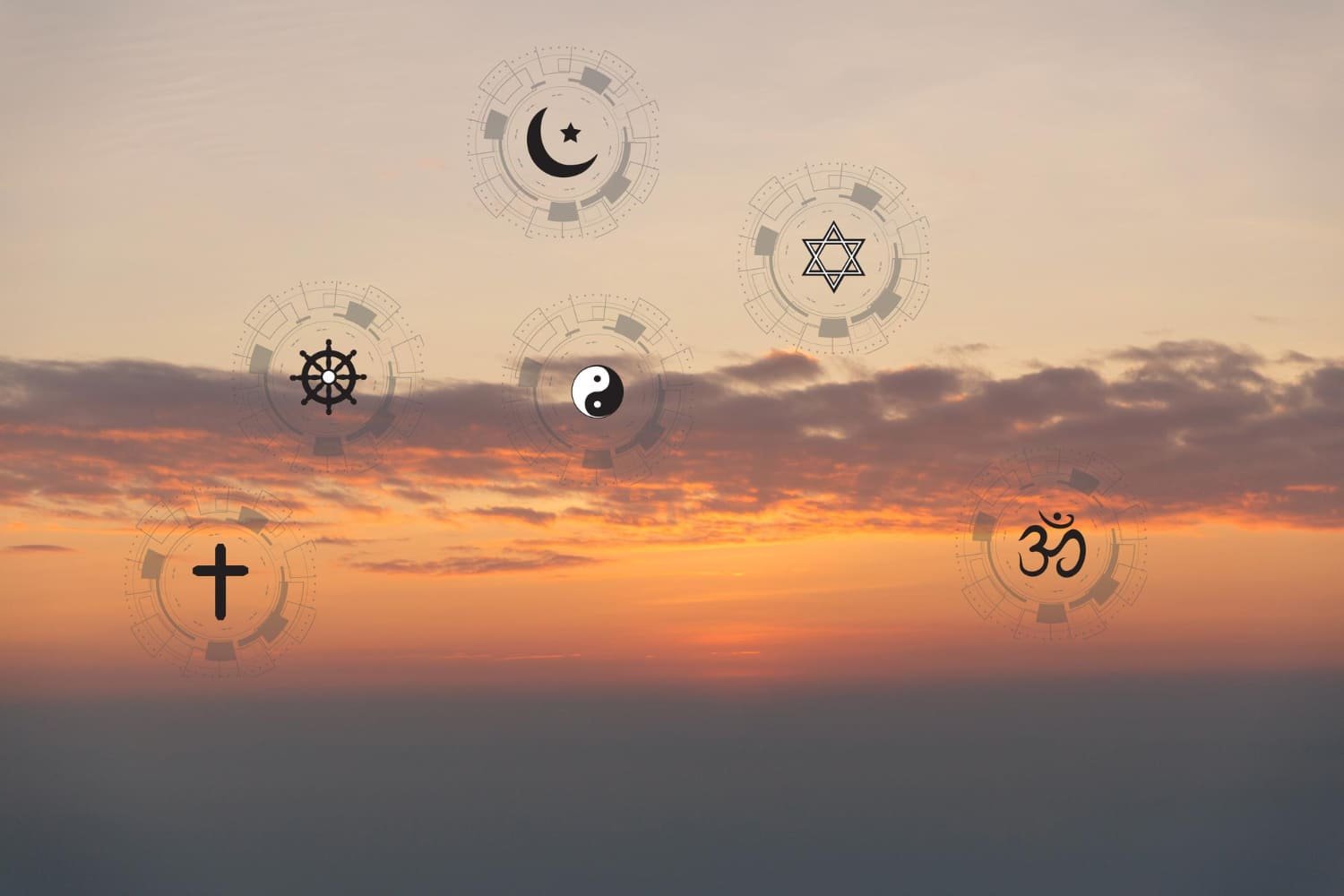Judaism and Christianity are two of the world’s most widely practiced religions. They have many similarities, such as their shared belief in one God, and their roots in the ancient Near East. However, they also have many differences that set them apart from each other.
Understanding these differences is important for anyone seeking to learn more about these religions, or to make an informed decision about which one to follow.
One of the most significant differences between Judaism and Christianity is their view of Jesus Christ. Christians believe that Jesus is the son of God and the savior of the world, while Jews do not accept Jesus as divine.
This difference in belief has led to many other differences in practice and doctrine, such as the Christian emphasis on salvation through faith in Jesus, and the Jewish emphasis on obedience to God’s laws.
Another difference between Judaism and Christianity is their approach to scripture. While both religions share many of the same texts, such as the Hebrew Bible, they interpret these texts in different ways.
For example, Christians view the Hebrew Bible as a precursor to the New Testament, while Jews see it as a complete and self-contained scripture.
These differences in interpretation have led to different beliefs and practices in areas such as religious law and worship.
Beliefs and Practices
Christianity and Judaism are two Abrahamic religions that have similar origins but have varying beliefs, practices, and teachings. The major difference between the two religions is their view of Jesus Christ.
Christians believe that Jesus is the son of God and the savior of the world, while Jews do not view Jesus as a divine being. They believe that Jesus was a Jewish teacher and not the Messiah.
Another major difference between the two religions is their view of the afterlife. Christians believe in the concept of heaven and hell, and that one’s eternal destination is determined by their faith in Jesus Christ.
Jews, on the other hand, believe in the concept of the world to come, where the soul is judged based on one’s deeds during their lifetime. This judgment determines the soul’s eternal destiny.
Both religions have their own unique practices and traditions. Christianity has sacraments, such as baptism and communion, which are seen as sacred rituals that connect believers to God. Judaism has its own set of rituals, including the Sabbath, Passover, and Yom Kippur. These practices help Jews to connect with God and their community.
Another difference between the two religions is their approach to scripture. Christians believe in the Bible, which includes the Old and New Testaments. The Old Testament is the Jewish Bible, but Christians interpret it differently than Jews do.
Jews believe in the Hebrew Bible, which includes the Torah, the Prophets, and the Writings. They also have a vast body of oral law and commentary that help to interpret the written law.
Overall, while Christianity and Judaism share some similarities, they have significant differences in their beliefs and practices. Each religion has its own unique way of connecting with God and understanding the world around them.
Holy Scriptures
Judaism and Christianity have different holy scriptures that form the basis of their respective religions.
The Jewish holy scripture is the Hebrew Bible, also known as the Tanakh, which consists of three parts: the Torah, the Prophets, and the Writings.
The Torah contains the first five books of the Bible and outlines the laws and teachings of Judaism. The Prophets and Writings contain historical accounts, poetry, and wisdom literature. On the other hand, Christianity’s holy scripture is the Bible, which consists of two parts: the Old Testament and the New Testament.
The Old Testament contains the same books as the Hebrew Bible, while the New Testament contains accounts of the life and teachings of Jesus Christ, as well as letters written by early Christian leaders.
The differences in the holy scriptures of Judaism and Christianity reflect the different beliefs and practices of the two religions. For example, Christians believe that Jesus is the son of God and the savior of humanity, while Jews do not accept Jesus as divine.
Despite these differences, both religions place a strong emphasis on the study and interpretation of their respective holy scriptures. In Judaism, the study of the Torah is considered a central religious practice, while in Christianity, the Bible is often read and interpreted in church services and personal study.
Overall, the holy scriptures play a crucial role in the religious beliefs and practices of both Judaism and Christianity. While the two religions have different scriptures and interpretations, they both value the study and understanding of these texts as a means of connecting with the divine.
God and the Messiah
Judaism and Christianity have different beliefs about God and the Messiah. In Judaism, God is considered one and indivisible, and the belief in the Trinity is rejected. Jews believe that God is the creator of the universe and that he is omnipotent, omniscient, and benevolent.
They also believe that God gave the Torah to Moses at Mount Sinai, and that the Torah contains the laws and teachings that govern Jewish life.
On the other hand, Christians believe in the Holy Trinity, which consists of God the Father, God the Son (Jesus), and God the Holy Spirit. They believe that Jesus is the Son of God, and that he was sent to Earth to save humanity from sin. Christians also believe that Jesus will return to Earth one day to judge the living and the dead.
The concept of the Messiah is also different in Judaism and Christianity. In Judaism, the Messiah is a human being who will be anointed by God to lead the Jewish people to redemption.
Jews believe that the Messiah will bring about a time of peace and prosperity, and that he will rebuild the Temple in Jerusalem. However, they do not believe that the Messiah will be divine or that he will die and be resurrected.
On the other hand, Christians believe that Jesus is the Messiah, and that he fulfilled the prophecies of the Old Testament. They believe that Jesus was both fully human and fully divine, and that he died on the cross to atone for the sins of humanity. Christians also believe that Jesus was resurrected from the dead, and that he ascended into heaven.
Salvation and Afterlife
Judaism and Christianity have different beliefs about salvation and the afterlife. In Judaism, salvation is primarily focused on the destiny of Israel as the chosen people of Yahweh, the God of Israel.
The Jewish concept of salvation is not based on individual faith or belief, but rather on the collective destiny of the Jewish people. The ultimate goal of Jewish salvation is the establishment of the Messianic Age, which will bring peace and justice to the world.
On the other hand, Christianity teaches that salvation is a personal matter that is achieved through faith in Jesus Christ.
According to Christian belief, Jesus died on the cross to atone for the sins of humanity, and those who accept him as their savior will be saved and granted eternal life in heaven. In contrast to Judaism, Christianity places a strong emphasis on individual faith and belief.
When it comes to the afterlife, both Judaism and Christianity believe in some form of life after death. In Judaism, there are different beliefs about what happens to the soul after death, but the most common belief is that the soul goes to a place called Sheol.
Sheol is not the same as the Christian concept of hell, but rather a place of waiting where the soul is purified before it can enter the world to come.
In Christianity, the afterlife is divided into two destinations: heaven and hell. Those who have accepted Jesus Christ as their savior and lived a righteous life will go to heaven, while those who have rejected him or lived a sinful life will go to hell.
Christianity places a strong emphasis on the concept of judgment, where God will judge each person and determine their eternal destiny.
Overall, the concepts of salvation and the afterlife are fundamental differences between Judaism and Christianity. While both religions believe in a higher power and some form of life after death, the way they approach these concepts is vastly different.
Comparison of Holidays and Celebrations
Judaism and Christianity have many similarities and differences when it comes to their holidays and celebrations. Both religions have important holidays that are celebrated annually, but they differ in their significance and practices.
Jewish Holidays
Judaism has many holidays throughout the year, including the High Holy Days of Rosh Hashanah and Yom Kippur, which are considered the most important. Other significant holidays include Passover, Hanukkah, and Purim.
Passover is a celebration of the Jewish people’s liberation from slavery in Egypt. It is celebrated with a special Seder meal and the reading of the Haggadah. Hanukkah is a celebration of the rededication of the Temple in Jerusalem and is celebrated with the lighting of the menorah.
Purim is a celebration of the salvation of the Jewish people from Haman’s plot to destroy them and is celebrated with the reading of the Megillah and the giving of gifts to friends and family.
Christian Holidays
Christianity has several important holidays throughout the year, with Christmas and Easter being the most significant. Christmas is celebrated as the birth of Jesus Christ and is celebrated with the exchange of gifts and the decoration of Christmas trees.
Easter is celebrated as the resurrection of Jesus Christ and is celebrated with church services and the exchange of Easter eggs.
Other Christian holidays include Good Friday, which commemorates the crucifixion of Jesus Christ, and Pentecost, which celebrates the descent of the Holy Spirit upon the Apostles.
Comparison of Holidays
While there are some similarities between Jewish and Christian holidays, there are also significant differences. Jewish holidays tend to be more focused on the history and traditions of the Jewish people, while Christian holidays are more focused on the life and teachings of Jesus Christ.
Another major difference is the way the holidays are celebrated. Jewish holidays typically involve special prayers, meals, and rituals, while Christian holidays involve church services and the exchange of gifts.
Overall, the holidays and celebrations of Judaism and Christianity reflect the beliefs and practices of each religion and are an important part of their respective cultures.
Similarities and Differences
Christianity and Judaism are two of the world’s largest monotheistic religions, both tracing their origins back to the ancient Hebrew scriptures. While there are some similarities between the two religions, there are also significant differences in their beliefs, practices, and teachings.
Similarities
- Both religions believe in the existence of one God who is the creator of the universe.
- Both religions have holy scriptures that serve as the foundation of their beliefs and practices.
- Both religions believe in the importance of prayer and worship as a means of connecting with God.
- Both religions have a strong emphasis on the importance of living a moral and ethical life.
Differences
Despite these similarities, there are also significant differences between Christianity and Judaism:
| Aspect | Christianity | Judaism |
|---|---|---|
| Beliefs about God | Christians believe in the Holy Trinity – one God in three persons: the Father, the Son (Jesus Christ), and the Holy Spirit. | Jews believe in one God, who is indivisible and cannot be subdivided into different persons or entities. |
| Beliefs about Jesus | Christians believe that Jesus is the Son of God and the savior of humanity who died for the sins of the world and rose from the dead. | Jews do not believe that Jesus is the Messiah or a divine being. |
| Beliefs about Salvation | Christians believe that salvation comes through faith in Jesus Christ as the Son of God and the savior of humanity. | Jews believe that salvation comes through living a righteous and ethical life in accordance with God’s commandments. |
| Religious Practices | Christianity has various religious practices, including baptism, communion, and confession. | Judaism has various religious practices, including circumcision, keeping kosher, and observing the Sabbath. |
These are just a few of the many differences between Christianity and Judaism. Both religions have their own unique traditions, beliefs, and practices that make them distinct from one another.
Which One is Better?
It is not appropriate to say which religion is better than the other. Both religions have their own unique beliefs, practices, and teachings. It is up to individuals to decide which religion is better suited for them based on their personal beliefs and values.
Some people may prefer Christianity because of its emphasis on forgiveness and redemption through Jesus Christ. Others may prefer Judaism because of its focus on living a good life through right conduct as prescribed in the Mosaic Covenant.
It is important to note that both religions have had a significant impact on the world and have contributed to the development of Western civilization. Christianity has had a profound influence on art, music, literature, and philosophy, while Judaism has contributed to the development of Western legal systems and ethical principles.
Ultimately, the decision of which religion is better is a personal one and should be based on individual beliefs and values.







